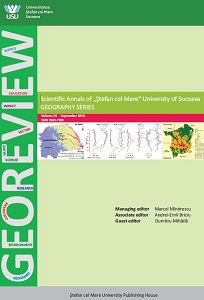Le transport collectif par voie d’eau à Abidjan, un moyen de lutte contre le réchauffement climatique
Public transport by water in Abidjan, a means for combating global warming
Author(s): Seydou Ouattara, Adjoba Marthe Koffi-DidiaSubject(s): Energy and Environmental Studies, Physical Geopgraphy, Human Ecology, Environmental interactions, Transport / Logistics
Published by: UNIVERSITATEA »ȘTEFAN CEL MARE« SUCEAVA
Keywords: Abidjan; lagoon transport; global warming; environment; short distance transport;
Summary/Abstract: Despite the importance of the hydrographic system, cabotage remains less exploited in Côte d'Ivoire. Nevertheless, it is more visible in the coastal regions where the presence of the lagoon has caused a spatial break. But Abidjan remains the most exploited Ivorian locality in this area. The city has experienced rapid expansion which causes a sustained demand for travel because it is fragmented by a lagoon water body which lengthens distances between its compartments. So, less expensive, faster, more ecological, shorter lagoon transport compared to land transport should be a response to improving the transport of goods and people. This is why through this research; it is studied the policy of development of lagoon transport in Abidjan as a means for combating global warming. Literature research and field survey were used as a means of collecting the information necessary to conduct this study. Their exploitation provides several results related to lagoon transport used as a factor of reducing global warming. One of the elements identified is the modernization of the sector and the increase in stations on the lagoon banks which have an impact on road detours. The creation and multiplication of vehicle parking areas near lagoon stations is also a reason for reducing global warming. The introduction of multimodalism, which allows a segmentation of the journey between several means of transport, reduces greenhouse gases emitted. Finally, the massification of lagoon transport and mobility is accepted as a cause having an influence on global warming.
Journal: GEOREVIEW
- Issue Year: 33/2023
- Issue No: 2
- Page Range: 56-67
- Page Count: 12
- Language: French

